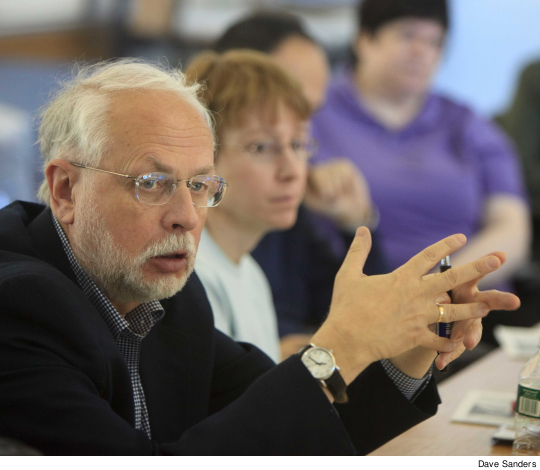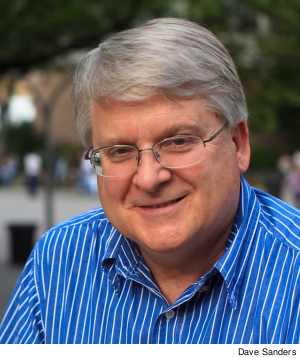 |
CUNY central administration’s plan to overhaul general education requirements has sparked months of debate, and this spring 80th Street promised that a revised proposal would reflect concerns raised in faculty discussion. But when CUNY released a revised version of the General Education initiative in mid-May, faculty governance leaders expressed bitter disappointment.
“The University Faculty Senate has devoted countless hours towards negotiation with Vice Chancellor Alexandra Logue, was promised by the Chancellor that its recommendations would be seriously considered, and now sees its labors as trivialized and a waste of time,” said UFS Chair Sandi Cooper. As Clarion went to press, Cooper said that some UFS leaders were advocating a motion of no confidence.
“Transparency and consultation have been the hallmark of the General Education initiative and the need for a rational transfer policy,” CUNY spokesperson Michael Arena replied via e-mail to Clarion. “Vice Chancellor Logue’s campus by campus ‘listening tour’ included many dozens of meetings with hundreds of faculty, deans, students and administrators,” said Arena, resulting in “substantive changes” to the proposal.
“The resolution provides colleges with a high level of flexibility, maintains academic standards and ensures students can transfer without loss of time or credits,” Arena added.
FACULTY SENATE
Discussion of general education and transfer issues was the focus of this year’s UFS Spring Conference, where faculty expressed strong concerns that the plan could undermine education at CUNY and weaken the faculty’s role.
CUNY’s revised proposal, scheduled for a vote at the Board of Trustees meeting on June 27, follows the same basic approach as the prior version. All CUNY undergraduates would be required to complete a 30-credit “Common Core” in order to graduate with an associate’s or baccalaureate degree. Transfer students could not be required to take more than 6 to 12 additional general education credits beyond the Common Core, depending on how many credits a student transfers with and whether a student has received an associate’s degree. Another provision would require all undergraduate courses taken for credit at CUNY colleges to be accepted for credit at all other CUNY colleges.
 |
In a significant shift of authority, courses in a college’s Common Core would be required to meet certain university-wide criteria, and the University Office of Academic Affairs would have the power to accept or reject a course as being in compliance. Recommendations for those criteria would be made by a task force appointed by the chancellor, in a report due December 1 of this year.
Francisco Soto, a professor of Spanish and Latin American literature at CSI, was one of a half-dozen panelists who spoke at the UFS conference, held at John Jay College on April 29.
Soto noted that CSI had spent more than a decade strengthening its general education requirements, and said he worried that CUNY’s proposed changes would unravel CSI faculty’s efforts to provide students with a strong, challenging liberal arts education. “It’s our responsibility to open the world to them,” Soto said.
Panelist Pamela Mills, a professor of physical chemistry at Hunter, expressed similar concerns, saying that the proposal would mean “a reduction in standards.”
The shift in authority from college faculty to CUNY central administration has been a major concern of the plan’s critics. The UFS conference, in fact, was titled, General Education & Faculty Authority: CUNY’s Future. “These proposed changes are symptomatic of the bureaucratization and the corporatization of the University,” commented Joshua Wilner, a professor of English and comparative literature at City College and the panel’s moderator.
CART BEFORE HORSE
Philip Belcastro, a panelist who is chair of BMCC’s Faculty Senate, criticized the report that CUNY administration issued last October, “Improving Student Transfer at CUNY,” for its focus on the number of students graduating with an “excess” of credits above the 120 required for a baccalaureate degree. Belcastro noted that students’ interests often evolve during their time in college and that their majors change as well. To assume that extra credits are wasted credits, he said, was “putting the cart before the horse.”
Some faculty have argued that the administration has tended to conflate issues around general education with the separate question of acceptance of transfer credits for a course prerequisite or requirements for a major. “There’s a significant difference between a problem with transfers and with general education requirements,” CSI’s Soto told the UFS conference.
“Let’s get discipline councils up and moving,” urged Belcastro. “That’s a real solution,” he said, to the problem of transfer credits being rejected by senior colleges. In a similar vein, Francisco Fernandez, a panelist who chairs the Natural Sciences Department at Hostos Community College, highlighted the importance of articulation agreements between community and senior colleges.
The proposal as issued in May, however, rejects the use of discipline councils – CUNY-wide groups of department chairs in a given field – in favor of new bodies selected by CUNY central administration. In order that “clear pathways be created for the largest transfer majors,” the plan states, the chancellor “will convene relevant disciplinary committees consisting predominantly of faculty.” By May 1 of next year, these new bodies are to recommend no fewer than three and no more than six courses as “entry-level courses for beginning the major, or as prerequisites for such courses.”
The UFS’s Cooper criticized the avoidance of the discipline councils. “Vice Chancellor Logue rejects their use because, she claims, community college faculty say these are dominated by senior college faculty and do not represent their work,” Cooper told Clarion. But “this allegation has been made once by one group,” Cooper said, while in the past four months eight other discipline councils have met with no such issues. “There is no sign that the central administration is willing to consult these representative groups, and it appears to distrust anything organized by the faculty itself,” Cooper said.
Logue did not respond to a Clarion request for comment on the discipline councils.
DISCIPLINE COUNCILS
BMCC’s Belcastro, who chairs the discipline council in health education, noted that the Board of Trustees resolution creating the discipline councils in 1993 charged them with “identify[ing] ways in which each field can be strengthened across the University in areas such as curriculum [and] program development.” By excluding the councils “from arguably one of the most extensive curricular modifications in recent memory,” Belcastro said, the Board would “concede that its commitment to faculty and faculty governing bodies is pro forma.”
Faculty governance bodies at nine of the eleven senior colleges have passed resolutions opposing the administration’s plan. At the community college level, only QCC has acted similarly. On May 10, the school’s Academic Senate approved a resolution opposing the linkage of transfer with general education curricula while sidestepping the issue of how many credits should be devoted to general education. The vote was yes: 33, no: 8 and 17 abstentions.
Vice-Chair Peter Bales was among those who abstained. Bales told Clarion that while he did not favor CUNY’s approach to the transfer problem, he thought it was preferable to the continued status quo.
“There’s nothing else on the horizon as far as senior colleges not continuing to disrespect our courses and our students,” Bales said. “It seems unfortunate that we have to strip individual colleges of their right to set their own course requirements.”
Emily Tai, chair of the QCC Academic Senate Steering Committee, supported the resolution. At the UFS conference, Tai said she was concerned that the proposed changes would encourage more community college students to transfer before completing their associate’s degrees. This is not in most students’ interest, she said, since those who complete their associate’s degree before transferring to a senior college are more likely to earn a four-year degree as well.
“If we have them [students] for the full 60 credits,” Tai said, “we can help them prepare for the more competitive environment of a senior college.”
On the senior college side, Scott Dexter, professor of computer science and director of Brooklyn College’s Core Curriculum, told Clarion that CUNY’s plan “will severely weaken colleges’ ability to evaluate students’ readiness for advanced or specialized study, and limit the extent to which we can prepare students for the unpredictable demands of professional life.”
The UFS conference also heard from several members of the University Student Senate (USS), all of whom spoke in favor of CUNY’s proposal, though the USS as a whole has not voted on the matter. Students quoted in a May 20 New York Times story expressed either support or mixed feelings about the plan.
But Manfred Philipp, former chair of the Chemistry Department at Lehman College and former chair of the UFS, argues that CUNY has only recently begun to implement basic administrative measures that would have a big impact on transfer problems.
BETTER ADVISEMENT
For years, senior college faculty have been unable to access the prior college records of CUNY transfer students – something that has not been a problem for transfers from non-CUNY schools. This has made it much harder to offer useful guidance, Philipp told Clarion. CUNY did recently institute a university-wide system for exchanging students’ records, but Philipp said that it has been poorly publicized.
He added that community college students could receive much better advice on which prerequisite courses to take for a given degree path if the University upgraded its Transfer Information and Programming Planning System, or TIPPS. “It’s blindingly obvious how they could fix this [transfer] problem and they have no interest doing it,” Philipp said. “It leads me to question what is going on here.”
Angela Anselmo, director of the SEEK Program at Baruch, told Clarion that mentoring and early outreach to prospective transfer students starting from their first semester at a community college can make an enormous difference. “If you put money in advisement, you don’t have to tweak curriculum,” Anselmo said. But to provide this kind of support to every student who needs it, she noted, would require a large infusion of new resources for CUNY.
RELATED COVERAGE & RESOURCES:
Op-ed from the May Clarion
CUNY proposal and other info
UFS resources on general ed

